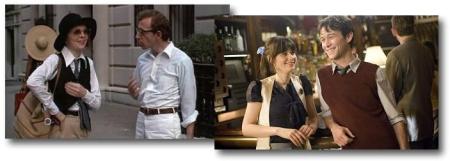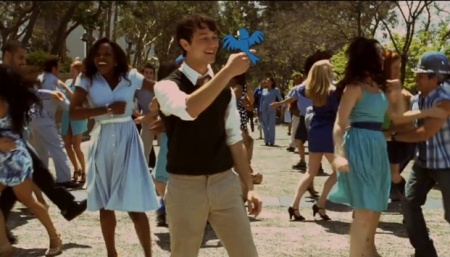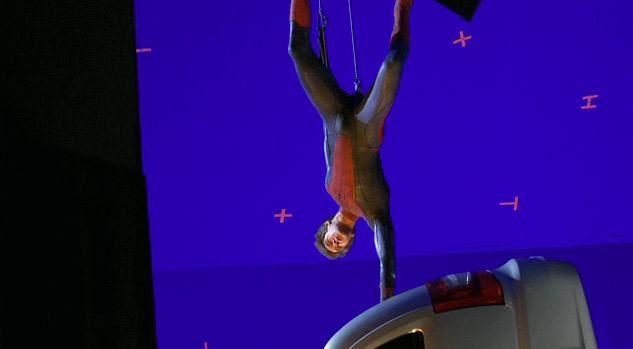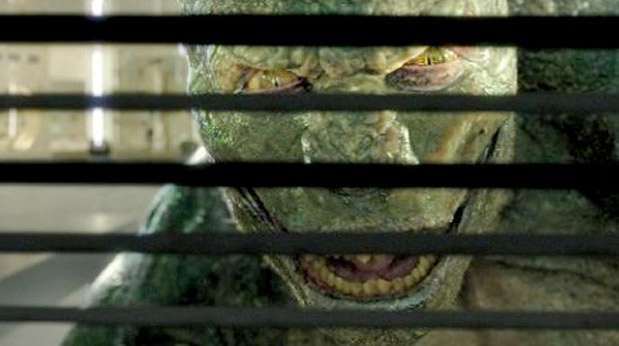Robert here, with my series Distant Relatives, where we look at two films, (one classic, one modern) related through a common theme and ask what their similarities and differences can tell us about the evolution of cinema. We'll be getting to some of this year's Oscar nominees shortly. But for now take a breather.

Women are from Mars, Men are from Venus
Turn on the television and chances are, especially if you're watching a commercial, for light beer, you'll get a pretty simple and standard view of the battle between the sexes. Men are aloof, sex-craved pigs who want to watch sports and pick up dumb girls while tolerating their nagging girlfriends who read romance novels and would prefer it if their boyfriends would talk more about their emotions like they do. This easy narrative is supposed to be funny because it's based in truth. If that was ever the case, it seems that now we've gotten to a point where reality has folded over on itself and now people believe truth to be based on this narrative.
Truth is, most of the guys I know are like Alvy Singer or Tom Hansen, men who, due to a combination of self doubt, loneliness and a good helping of life's little disappointments have placed an unreasonable but understandable amount of importance into the hope of finding that perfect girl who will comfort wounds, give endless encouragement and generally elevate their existence on this planet (did I say "guys I know?" I speak a bit from experience as well.) Annie Hall and (500) Days of Summer are two films about two such men thinking they've found it only to realize that it is a lot more complicated than they wanted.

Sad Sack
Alvie Singer, twice divorced, product of a dysfunctional existence, career in neutral due to a self-imposed principle of avoiding L.A. falls hard for the down home girlish charms of Annie. Tom Hanson, failed architect, hopeless romantic, equally falls hard for Summer. She likes The Smiths, she sings Karaoke and she takes an interest. The film suggests she has something of an indefinable "it" factor. I will define it (in her and Annie's cases) as accessibility. Pretty women usually strike fear into the hearts of men like Alvie and Tom. One who doesn't inevitably becomes one of those girls who everyone falls in love with. Whether they are really as accessible as they appear is another thing.
Summer Finn and Annie Hall are significantly different, perhaps products of their time. Summer's fear of commitment and disbelief in love stem mostly from her parents' divorce. Contrastly, Annie comes from a Norman Rockwell-esque existence. She doesn't mind commitment but wants to enjoy life and make the most of her big city opportunities. Summer and Annie don't need to be similar for these films to adequately reflect one another, they just need to be equally incompatible with Tom's romanticism and Alvy's pessimism... and they are.

Boy does not get girl back
Both films are disinterested in giving us a structured throughline of a relationship's destruction, and have a nature to jump around within time or the minds of our protagonists. Yet in doing so, both give us a fairly honest portrayal of a brief relationship: two people whose differences are danced around, denied and avoided until they have to be faced, overcome or the relationship ends. Both men, like so many men in films these days, like so many films themselves these days, see women in terms of how they effect their own lives, not as fully formed people, but means to the end of endless happiness. Both do so at their relationship's peril.
In (500) Days of Summer, Tom often defines his life by the culture he knows. When he's happy he becomes Han Solo, bluebirds dance on his finger. When he's sad, his misery manifests itself as a French or Swedish art film. This idea, of media defining our lives is often considered a new one, brought on by endless exposure. But it's not that new. Woody Allen was doing it in Annie Hall.He envisions Annie as Snow White's evil queen. He produces Marshall McCluhan at will to win an argument. People have been defining their lives with concepts and images from art since art has been expressing our emotions better than we could. As someone who's uttered the phrase "I'm due back on planet Earth now" or whose been tempted to break out dancing to "You Make My Dreams" I suggest that these two films have now joined the ranks of such art.
As for the major differences between the films, thematically there aren't many. Boy meets girl, boy loses girl, roll credits, may not be the escapist fare that people think they want to see, but these films prove that there can be plenty of laughter and insight in the journey. Alvy Singer's observation that we keep falling in love because "we need the eggs" still remains true (not to mention one of the best observations ever made in a film). Perhaps that's a testament to human nature. As much as the world has changed between 1977 and 2009, some things always stay the same.
 Friday, March 21, 2025 at 8:30PM
Friday, March 21, 2025 at 8:30PM 






